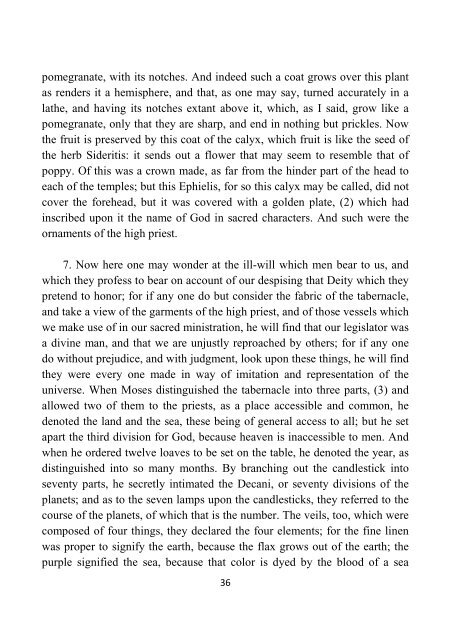From the Exodus Out of Egypt to the Rejection of That Generation - Flavius Josephus
Create successful ePaper yourself
Turn your PDF publications into a flip-book with our unique Google optimized e-Paper software.
pomegranate, with its notches. And indeed such a coat grows over this plant<br />
as renders it a hemisphere, and that, as one may say, turned accurately in a<br />
la<strong>the</strong>, and having its notches extant above it, which, as I said, grow like a<br />
pomegranate, only that <strong>the</strong>y are sharp, and end in nothing but prickles. Now<br />
<strong>the</strong> fruit is preserved by this coat <strong>of</strong> <strong>the</strong> calyx, which fruit is like <strong>the</strong> seed <strong>of</strong><br />
<strong>the</strong> herb Sideritis: it sends out a flower that may seem <strong>to</strong> resemble that <strong>of</strong><br />
poppy. Of this was a crown made, as far from <strong>the</strong> hinder part <strong>of</strong> <strong>the</strong> head <strong>to</strong><br />
each <strong>of</strong> <strong>the</strong> temples; but this Ephielis, for so this calyx may be called, did not<br />
cover <strong>the</strong> forehead, but it was covered with a golden plate, (2) which had<br />
inscribed upon it <strong>the</strong> name <strong>of</strong> God in sacred characters. And such were <strong>the</strong><br />
ornaments <strong>of</strong> <strong>the</strong> high priest.<br />
7. Now here one may wonder at <strong>the</strong> ill-will which men bear <strong>to</strong> us, and<br />
which <strong>the</strong>y pr<strong>of</strong>ess <strong>to</strong> bear on account <strong>of</strong> our despising that Deity which <strong>the</strong>y<br />
pretend <strong>to</strong> honor; for if any one do but consider <strong>the</strong> fabric <strong>of</strong> <strong>the</strong> tabernacle,<br />
and take a view <strong>of</strong> <strong>the</strong> garments <strong>of</strong> <strong>the</strong> high priest, and <strong>of</strong> those vessels which<br />
we make use <strong>of</strong> in our sacred ministration, he will find that our legisla<strong>to</strong>r was<br />
a divine man, and that we are unjustly reproached by o<strong>the</strong>rs; for if any one<br />
do without prejudice, and with judgment, look upon <strong>the</strong>se things, he will find<br />
<strong>the</strong>y were every one made in way <strong>of</strong> imitation and representation <strong>of</strong> <strong>the</strong><br />
universe. When Moses distinguished <strong>the</strong> tabernacle in<strong>to</strong> three parts, (3) and<br />
allowed two <strong>of</strong> <strong>the</strong>m <strong>to</strong> <strong>the</strong> priests, as a place accessible and common, he<br />
denoted <strong>the</strong> land and <strong>the</strong> sea, <strong>the</strong>se being <strong>of</strong> general access <strong>to</strong> all; but he set<br />
apart <strong>the</strong> third division for God, because heaven is inaccessible <strong>to</strong> men. And<br />
when he ordered twelve loaves <strong>to</strong> be set on <strong>the</strong> table, he denoted <strong>the</strong> year, as<br />
distinguished in<strong>to</strong> so many months. By branching out <strong>the</strong> candlestick in<strong>to</strong><br />
seventy parts, he secretly intimated <strong>the</strong> Decani, or seventy divisions <strong>of</strong> <strong>the</strong><br />
planets; and as <strong>to</strong> <strong>the</strong> seven lamps upon <strong>the</strong> candlesticks, <strong>the</strong>y referred <strong>to</strong> <strong>the</strong><br />
course <strong>of</strong> <strong>the</strong> planets, <strong>of</strong> which that is <strong>the</strong> number. The veils, <strong>to</strong>o, which were<br />
composed <strong>of</strong> four things, <strong>the</strong>y declared <strong>the</strong> four elements; for <strong>the</strong> fine linen<br />
was proper <strong>to</strong> signify <strong>the</strong> earth, because <strong>the</strong> flax grows out <strong>of</strong> <strong>the</strong> earth; <strong>the</strong><br />
purple signified <strong>the</strong> sea, because that color is dyed by <strong>the</strong> blood <strong>of</strong> a sea<br />
36

















